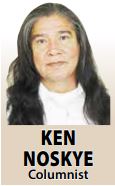When Ken died in February, we had an outpouring of messages from readers, with many telling us how much his columns meant
to them. In light of that, we thought we would go back through our files and re-publish some of his columns. Ken would be flattered by the
kind words readers expressed. We miss him as a friend and as a storyteller

Opimbataw was real.
When I was nine years old, I would hear stories about Opimbataw, which translates from Cree to English as The Runner; but it literally means someone who runs all over the place.
At the time, I only spoke Cree and in my first language the stories were fascinating. There were several stories about him being seen in one section of the reserve, only to be sitting having tea in another. People said he would run through deep forest like a cougar.
One story told of Opimbataw racing a horse and rider across the lake.
The lake where I spent a great part of my childhood, and where I still live, is huge. The section of the frozen lake that was chosen for the race was about four miles bank to bank. The catch was that the horse and rider would take the gravel road alongside the lake, but Opimbataw would run across the ice-and-snow covered lake.
Word of the race between a man and a horse got around our community and beyond. People gathered at the start line, but there were many more at the finish line.
On the morning of the big race, there was blowing snow and fog, but the show must go on. The young man chosen to ride the horse was a wellknown rodeo rider who never got bucked off.
The horse was a black stallion captured as a wild horse. It was said the only way that horse could have been captured was by drugging him with a dart because he ran so fast.
The sky was still hazy when those at the start line gathered to see the two competitors shake hands. The horse and rider were taken toward the gravel road, which was slightly longer, but there were straightaways. Opimbataw headed to the edge of the lake and got ready.
A man with a shotgun fired a shot so the people on the other side would know the race had begun. The loud bang of the shotgun echoed across the lake, and off the racers went.
This was the late 1960s, and back then not many people on the reserve owned vehicles. My home community was just becoming alive with freedoms that were previously against the law.
It was the first decade First Nations people were allowed to vote, officially making them A People. We can thank my favourite prime minister, John Diefenbaker, for that one.
And there were no laws for how many people could squeeze into a vehicle. About a dozen people hitched rides as the trucks followed the horse and rider. There were still a few people there when Opimbataw disappeared into the fog.
People on the finish line tried to find him, but there was no sign of him. Throughout the forestlined lake, the sounds of people screaming and hollering could be heard.
The noise was coming from the backs of the trucks where people were cheering on the horse and rider. It was said the horse never ran so fast and the rider kept low to better streamline the wind.
When that group reached the finish line, they could see people still gathered at the lake. They thought right away about the so-called legend. But when they reached the finish line, they could see Opimbataw shaking hands and getting hugs.
Recently, I was sitting with a group of senior elders from my reserve and I asked them if they remember those stories. Of course, they did.
They told me other stories about him. One of them asked me if I knew Opimbataw was a real person. I then recalled seeing him and started to remember him running all over the place.
Then one elder told me how a big part the story of the great race was left out. Someone from the start line had decided to follow the tracks of Opimbataw crossing the lake. When the fog overtook the tracker, he relied on the tracks. He followed the tracks until they turned to wolf tracks.
Opimbataw was a shift-changer — someone with the ability to turn himself into a shape of an animal. When the tracker was reaching the finish line, the tracks went back into human tracks. This is a part of the story that was never told because nobody would believe it. But I believe it.
I believe shift-changers walk among people and they fit right in. It may not be into an animal, but into a whole different person. I have seen too many people written off by society, only to see those people come back after turning their lives around.
I have seen those caught in the cycle of extreme alcohol abuse come back to help those who still suffer. I have seen young women forced onto the streets come back to help their sisters walk a healthy road.
I know former gang members walk out of prison to form a group on the street to help young people break away from a gang lifestyle. Those are the shift-changers I am talking about. I have seen them. I know many, even some I grew up with.
I know one man who was a heroin and cocaine addict who physically changed so much that not even those close to him recognized him. I saw him stumble and fall only to get up again and again. I watched him grow; I watched him grow physically, spiritually and mentally to a point where now he writes stories — true stories — about Opimbataw.
-Ken Noskye

Leave a Reply